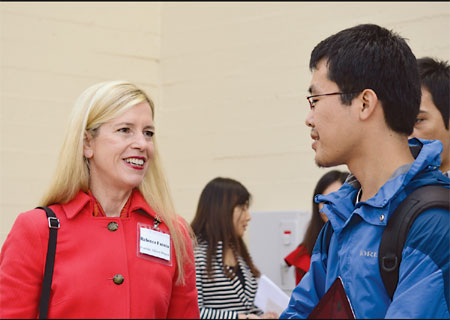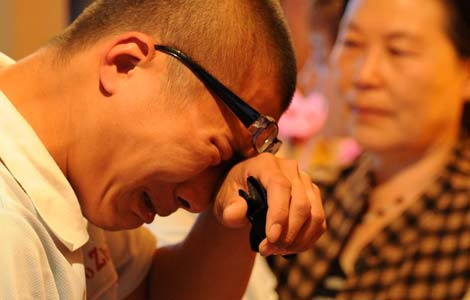China forum explores startup landscape
Updated: 2013-11-18 09:02
By CHEN JIA in Berkeley (China Daily USA)
|
||||||||
|
Keynote speaker Rebecca Fannin interacts with a participant at the China Forum conference at the University of California - Berkeley on Sunday. Chen Jia / China Daily |
Early Sunday morning, the screeching of a fire alarm sent about 140 people rushing out of a hall on UC Berkeley's campus where they were attending a China Forum conference.
The interruption dampened no one's enthusiasm. Berkeley students, Silicon Valley entrepreneurs and academics alike, holding their donuts and coffee, just kept talking. Among them was the morning's keynote speaker Rebecca Fannin.
As a journalist, author and entrepreneur, Fannin is a contributor to Forbes.com, and author of two influential books — Silicon Dragon and Startup Asia.
The first wave of technology entrepreneurship in China was always about "copycats" and overseas "returnees" like graduates from Berkeley, Stanford and MIT, she said on Sunday.
However, the second wave of technology entrepreneurship has been about the "micro innovation from Chinese locals", she said.
"I started to document this transition in 2008, and China has been the most dynamic market I have covered," she told China Daily.
My next book might be more "global" in theme, but will absolutely include China and its Silicon Dragon, she said.
At Forbes.com, she writes a weekly column about innovation and startups in China and other emerging markets.
She also leads Silicon Dragon, a news, research and events group she formed in 2010 that today has a network of 13,000 technology, investment and business executives globally. Her group publishes Silicon Dragon news and programs and organizes forums and salons in China, the US, Europe and other of Asia's emerging markets.
"The first generation of Chinese returnees had become successful. Their companies have been taken public in the US and raised lot of money," she said.
Though most of the young generation of Chinese technology startups hasn't been able to go public yet, they are in the pipeline to create more success stories, she said.
"Markets in China will continue to boom. The Silicon Valley mode in China — I called Silicon Dragon style," she said.
She said today's startups were coming from all over China, not just Beijing and Shanghai, but also budding in Hangzhou, Chengdu, Shenzhen and so on, she said.
It has been the second year that Berkeley held such a forum. Its 2013 strategic partner is zPark Venture and sponsors are the Consulate General of China in San Francisco and the Associated Students of the University of California.
Stephen Young, the keynote speaker in the afternoon, shared his thoughts on American relations with a rising China on the forum. A former US diplomat, Young served as the US Consul General in Hong Kong.
"President Obama and Chinese President Xi Jinping focus on practical issues like climate change, which continues the two countries' long tradition of practical relations," he said.
"China is our No1 bilateral relationship with the United States. As people say, no important issue can be solved without the engagement of China and the US today," he said.
Both sides highlight our "common interest", "mutual trust" and "cooperation", he added.
The panels and interactive workshops on Sunday's China Forum included clean technology, intellectual property law in China, doing business with China, the crossroads of the Chinese economy and entrepreneurship.
"It's a good stage for Berkeley students, Chinese and American entrepreneurs in Silicon Valley, venture capitals and academics to sit together and communicate with each other," Zou Tian, the chief executive director of China Forum 2013, told China Daily.
Contact the writer at chenjia@chinadailyusa.com
- At least 29 killed in train collision in Egypt
- Kerry to visit Israel to discuss Iran deal
- 100 killed in tribal clashes in Sudan
- Commonwealth urges for inclusive growth
- Hot air balloons take off at Int'l Balloon Festival
- 5 foreigners, including 3 Chinese, missing in furnace blast in E. India: official
Most Viewed
Editor's Picks

|

|

|

|

|

|
Today's Top News
Reforms will tighten Sino-US links: Xi
PM Abe busy in ASEAN blitz aimed at Beijing
Bringing China's best minds home
 SAP innovates for China
SAP innovates for China
China forum explores startup landscape
End of laojiao to take time
Leadership's calls for reform hailed
MIT forum to help China tackle problems
US Weekly

|

|















